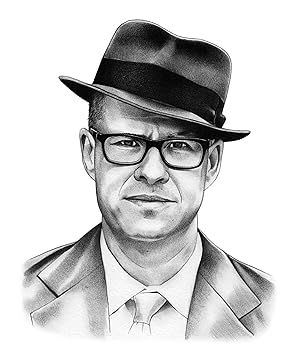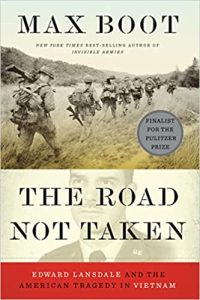The Road Not Taken: Edward Lansdale and the American Tragedy in Vietnam
In this epic biography of Edward Lansdale (1908– 1987), the man said to be the fictional model for Graham Greene’s The Quiet American, best-selling historian Max Boot demonstrates how Lansdale pioneered a “hearts and mind” diplomacy, first in the Philippines, then in Vietnam. It was a visionary policy that, as Boot reveals, was ultimately crushed by America’s giant military bureaucracy, steered by elitist generals and blueblood diplomats who favored troop build-ups and napalm bombs over winning the trust of the people. Through dozens of interviews and access to neverbefore-seen documents―including long-hidden love letters―Boot recasts this cautionary American story, tracing the bold rise and the crashing fall of the roguish “T. E. Lawrence of Asia” from the battle of Dien Bien Phu to the humiliating American evacuation in 1975. Bringing a tragic complexity to this so-called “ugly American,” this “engrossing biography” (Karl Marlantes) rescues Lansdale from historical ignominy and suggests that Vietnam could have been different had we only listened. With reverberations that continue to play out in Iraq and Afghanistan, The Road Not Taken is a biography of profound historical consequence. 54 photographs; 3 maps

About the Author
Max Boot
Max Boot is a bestselling author, historian, and policy analyst who has been called one of the “world’s leading authorities on armed conflict” by the International Institute for Strategic Studies. He is a columnist for the Washington Post, a global affairs analyst for CNN, and the Jeane J. Kirkpatrick senior fellow in national security studies at the Council on Foreign Relations. He is the author of the New York Times bestsellers “The Road Not Taken: Edward Lansdale and the American Tragedy in Vietnam” and “Invisible Armies: An Epic History of Guerrilla Warfare from Ancient Times to the Present.” His other books include the widely acclaimed: “The Savage Wars of Peace: Small Wars and the Rise of American Power” and “War Made New: Technology, Warfare, and the Course of History, 1500 to Today.” He has been called “a master historian” by the New York Times and a “a penetrating writer and thinker” by The Wall Street Journal.
Book Club Session
Session Notes:
Air Force Historical Foundation Book Club (Session Nine)
The Road Not Taken: Edward Lansdale and the American Tragedy in Vietnam
by Max Boot
28 June 2023
Moderated by Mr. John “Pepe” Soto and Ms. Jonna Doolittle and featuring special guest, Author Max Boot
Key Take-Aways:
- Edward Lansdale understood the need to win “hearts and minds” before it was a “thing” and was successful in the Philippines, however the strategy did not work as effectively in Vietnam based on leadership differences
- Large defense contracting and a technologically oriented mindset is NOT the way to win in a failing state, rather the best approach is a small team of advisors who work with leaders and cut down on human rights and power abuses
- Fundamental requirements for military dealings in foreign countries particularly for high level and combatant commanders are an understanding of politics, international relations, marketing and how to deal with people
Opening Remarks by Mr. John “Pepe” Soto and Ms. Jonna Doolittle on a book “about the most famous Air Force Intelligence Officer you’ve never heard of” and thanking Mr. Max Boot for supporting the Air Force Historical Foundation book club and the 9/12 project, respectively. Mr. Boot has multiple close partnerships with Air University press and has worked with Retired General Petraeus, Christian Science Monitor, the Wall Street Journal and is working with the Council on Foreign Relations, to name a few.
Max Boot: Thank you for the invite and letting me talk about Ed Lansdale, one of my favorite people. He’s buried at Arlington and waws a truly legendary and forgotten figure in the Air Force. His training was on the job, he couldn’t operate any weapons systems bigger than a .45 caliber pistol and was not formally trained in intelligence or public affairs.
Ed Lansdale was actually stateside during WWII doing intelligence and just as the war was ending, he was shipped abroad to the Philippines where he dealt with a greatly disordered society traumatized by the war. In the Philippines, Lansdale found a society plagued with the Huk Communist insurgency. He plunged in as an intel officer and then a public affairs officer and integrated quickly into the Philippine society.
Lansdale met Pat Kelly, who was a journalist and became the love of his life. I (MB) had access to the letters he wrote to his wife and to Pat Kelly, which gave me (MB) an unparalleled vantage point of what he was thinking, particularly in his personal life.
Professionally, Lansdale transitioned from the Army to the Air Force, which he saw as more congenial to out of the box thinking that the Army. He worked for the Office of Policy Coordination and pioneered population centric counterinsurgency which helped lead to the defeat of the Huk rebellion.
In 1953, Lansdale returned to the US, where Allen Dulles and President Eisenhower greeted him warmly, because he’d delivered a Cold War victory in the Philippines. In 1954, he was sent to Vietnam to accomplish a similar feat, where he befriended Ngo Dinh Diem the first xx of South Vietnam. He helped Diem consolidate authority and to maneuver. He argued that the fight in South Vietnam was about winning hearts and minds and the application of (US) troops was going to help North Vietnam, however President Johnson and General Westmoreland ignored his advice. Lansdale ended up as assistant secretary of the Special Operations Liaison in Irregular Conflict (SOLIC) where he helped bring Navy SEALS and Green Berets into being. He continued to be sidelined in Vietnam, where the strategy was focused on heavy firepower, which a culmination of the Tet Offensive.
We’ve seen in recent years that the counterinsurgency failed, while Lansdale always preached understanding and listening to the people you were working with. He was a character of “the quiet American”. People focused on the Psychological Operations methods must establish rapport and guide the population gently as opposed lecturing them. Lansdale figured out how to weaponize empathy, especially during a time when there was a lot of racism against Asians in particular.
Q&A
Mr. Soto: Lansdale’s whole Air Force career was totally non-standard, he made General Officer, in what was very much a pilot’s Air Force, without ever commanding an Air Force unit — is it more of being in the right place at the right time, or were his skills just that unique?
Mr. Boot: I think it was a combination of unique skills with exposure to the Eisenhower and Kennedy administrations who saw him as James Bond. He had a mystique about him and Dulles was also his Patron. The sponsorship came back to haunt him in the end when Robert MacNamera drove him out of the Air Force and kept him out of Vietnam. MacNamera was really numbers oriented and tried to evoke numbers and an equation in conflict. Lansdale told him that the X factor was the feelings of the people in Vietnam, which you can’t qualify and/or control from the Pentagon. His downfall was Operation Mongoose which was supposed to topple Castro without any US troops. When in Castro was not toppled in 1962, Lansdale lost favor with his protectors. Operation Mongoose was shut down after the Cuban Missile Crisis, and Lansdale was forced into retirement. This is an example of being able to advance with political favor, but also meeting downfall because of it.
Mr. Soto: How does someone who starts their career as a marketing executive become an expert in developing counterinsurgency strategies and executing COIN campaigns? Do you think his marketing background had something to do with his success?
Mr. Boot: Absolutely, he was in advertising. He know how to sell products to the public and how to appeal to consumers. He used this to sell Guerrilla wars to the people and it worked with Mac Tsai Tsai (?) in the Philippines and had limited success with Diem in Vietnam. The key is that governments need to be honest with the people and those who are familiar with Iraq and Afghanistan, know there’s a lot of corruption and abuses of power.
Mr. Soto: We really have no set career path today for our officers working on what we call “information warfare”, I really think we need to recruit marketing majors who think that way – far more than our political science majors do. He seemed to really try to understand the people and politics of the countries he worked in – was this the key to his successes?
Mr. Boot: There’s a tendency to send personnel on one-year tours where people sometimes know what’s going on, but the continuity is not great. Because Lansdale was outside of the normal bureaucracy, he was able to become more established especially with Pat Kelly being a Filipina. He was able to talk to farmers, businessmen, and politicians and came up with a strategy to combat insurgency. He encountered a language barrier in Vietnam, where they only spoke Vietnamese and French in the 50s. Furthermore, he had to practice tremendous patience with Diem who was a big windbag and could go on for 8 hours, requiring back and forth conversation.
Question from the audience: Did Lansdale ever mention our failure to learn from China, trying to contain a popular nationalist revolution by supporting a corrupt leader like Chiang Kai-Shek? At least in China we did not commit American forces to combat as we did in Vietnam. Foreign service officers recommended a policy similar to allied policy toward Yugoslavia.
Mr. Boot: There’s not much similarity between the Philippines and Taiwan. Mao was for liberal democracy and there are some parallels between what Lansdale was trying to do, but he had a low opinion of Chiang Kai-Shek. In WWII, FDR labeled China as having as much contribution as other Allied nations. Mao was no great democrat, and the division in 1949 of the Republic of China started the split. It’s tough to tell truth of the foreign service in the 1940s, but it’s important to listen to folks who know what’s going on the ground.
Question from Audience: There’s a book entitled “Kiss the Boys Goodbye” which is about the service members we left behind in Vietnam. That book says our success rate with assets we put into North Vietnam was virtually 0%. Very few of the assets worked out to our benefit. Did Lansdale ever make any claims about how successful we were?
Mr. Boot: The Geneva Convention Accords in 1954 were meant to create a roadmap for peace and reunification in Vietnam. People wanted to undermine Ho Chi Min & strengthen Diem in South Vietnam distributing leaflets and infiltrating assets into north Vietnam to include one of the great assets of the CIA. Most were rolled up by north Vietnamese security and were either executed or turned to work for the north Vietnamese. All in all, none lasted long as its hard to create an armed resistance with an effective police state. A leak of Pentagon Papers revealed various Top-Secret pieces.
Question from Audience: The general lack of understanding and listening to Gen Lansdale on COIN doctrine reminded me of Col Mitchell and his ideas and his ideas about the Air Force, which people realized he was right only after his death. Have you been able to talk to any current military officials or seen something similar to Lansdale where generals have actually recognized Lansdale’s ideas on COIN?
Mr. Boot: Some of what happened was reflected in the Iraq war when we realized that we couldn’t shoot our way out of an insurgency. Gradually, Generals Petraeus and Mattis released the 2006 insurgency doctrine, which worked for a bit. Now that we’re dealing with China and Russia, we often forget how to deal with lower intensity threats.
Mr. Soto: He seemed to understand the need to win “hearts and minds” before it became a “thing”. You go into detail on how he helped defeat the Huk insurgency in the Philippines, by running a democratic election. How did he make this “ballots vice bullets” strategy work?
Mr. Boot: I question if this was a strategy in Vietnam. This worked in the Philippines because Mac Tsai Tsai didn’t want to be a dictator. He even created a campaign song with a lot of marketing and mobilized NGOs to reduce electoral fraud. He created ready and free elections. When they tried to do the same thing in Vietnam, Diem wasn’t a democrat—he was interested in creating an illiberal Anti-American state acting more as a fascist. Furthermore, Westmorland and Johnson did not buy in. Because the Vietnamese state did not have buy in on democracy, similarly to Afghanistan, the US cut of state aid and the country collapsed; an Achilles Heel.
Question from Audience: In 1972 when Pres Nixon and the CREEP made the calculated decision in May 1972 to bomb Hanoi and Haiphong after polling related to the election showed that Americans would support the bombing for at least 6 months. He did this knowing it would not make a military difference. Did Lansdale ever discuss the strategic decisions from Nixon & Kissinger that informed tactical decisions? Was it all driven by politics?
Mr. Boot: I think he was aware and had a cynical perspective of Nixon. Nixon had the opportunity to bomb North Vietnam and show how tough he was. During the Paris Peace Accords, they had the opportunity to stop the war, but he didn’t want it to stop until after the 1972 elections. The sad thing is that we knew we weren’t going to prevail in Vietnam until after 1968 – it was futile and tragic that we didn’t stop earlier.
Question from Audience: Did Lansdale recognize the fact that Ho Chi Minh had just defeated the French and the country was supposed to have been reunited after country-wide elections? Had South Vietnam declared itself an independent?
Mr. Boot: Ho Chi Min was a great nationalist hero because he drove the French out. Nobody thought we could have risked a communist takeover in Vietnam, but things look differently in hindsight.
Question from Audience: Did Lansdale ever mention policy differences between Kennedy and Johnson administrations and missteps in the Vietnam Policy?
Mr. Boot: Lansdale was a high-level advisor in the Kennedy administration, but was pushed aside after Operation Mongoose. He was on the outs with Johnson, who was paranoid about not losing in Vietnam. Johnson thought the way to win was to kill more of the enemy.
Mr. Soto: What would you recommend people (we as Airmen?) should take away from the life of Edward Lansdale and the US Strategy in the Vietnam War & COIN?
Mr. Boot: The big take away is that big war and a tech mindset is not the way to win in a failing state. A lot of states in Africa like Somalia and Mali require a small team of advisors to advise leaders and cut down on abuses. It requires commitment and folks who have a lot of staying power. It’s tough to spread out to conventional places like China and Russia. We still need these skills in places like Indonesia and other countries in Asia. There’s a rise in even greater importance in unconventional situations when you’re dealing with insurgents. There’s a value in warheads on foreheads, but it comes with a lot of complicated nuances and complexities in fallen societies. 80% of what Combatant Commanders do is politics in which they deal with foreign leaders. Airmen need an understanding of politics, international relations, marketing and how to deal with people.
Mr. Soto: Thanks for bringing one of the most unknown Intelligence Officers to light in your book “The Road Not Taken”!
Capt Jenn (Mahowald) Brown ran technical solutions for this session and Maj Mel Sidwell Bowron produced notes. Both are Active-duty Air Force Intelligence Officers. Some statements in this document are paraphrased.
2023’s AFHF book club series honors the 50th Anniversary of the end of the Vietnam War.

